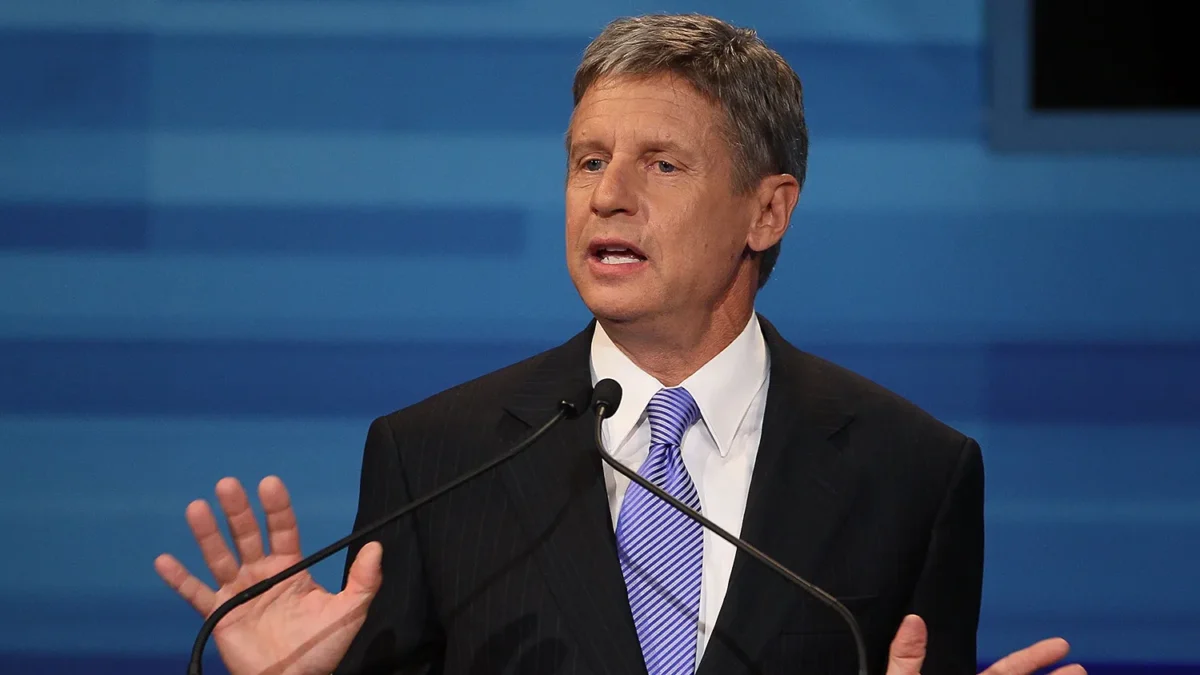Gary Johnson stands as one of the most successful Libertarian politicians in modern American history. From his entrepreneurial beginnings to becoming a two-term governor and presidential candidate, Johnson has championed limited government, fiscal responsibility, and personal freedom throughout his career. His pragmatic approach to libertarianism has earned him respect across political lines, even as he challenges the two-party system that dominates American politics.
Early Life and Business Success
Born January 1, 1953, in Minot, North Dakota, Gary Earl Johnson grew up in a middle-class family. After graduating from the University of New Mexico in 1975 with a degree in Political Science, Johnson founded Big J Enterprises, a construction company that started as a one-man operation. Through dedication and business acumen, he built it into one of New Mexico’s largest construction companies, employing over 1,000 people before selling it in 1999.
This business background shaped Johnson’s political philosophy—emphasizing efficiency, practical results, and fiscal discipline. Unlike many politicians, Johnson entered public service after proving himself in the private sector, bringing a business-minded approach to governance.
Governor of New Mexico

In 1994, Gary Johnson shocked the political establishment by winning the New Mexico gubernatorial race as a Republican in a predominantly Democratic state. Despite having no prior political experience, voters responded to his straightforward style and business credentials. Johnson served two consecutive terms from 1995 to 2003, demonstrating his appeal across party lines.
As governor, Johnson established himself as fiscally conservative while socially liberal—a combination that would later align perfectly with the Libertarian Party platform. His administration focused on:
- Cutting taxes 14 times while never raising them
- Reducing the state workforce by over 1,000 positions
- Eliminating the state’s budget deficit
- Vetoing over 750 bills, earning him the nickname “Governor Veto”
- Supporting school vouchers and education reform
- Advocating for marijuana legalization—an especially progressive position for the 1990s
Johnson left office with New Mexico enjoying a $1 billion budget surplus, a stark contrast to the deficit he inherited. His fiscal management received bipartisan praise, even from those who disagreed with his policy positions.
Libertarian Presidential Campaigns
After leaving the governor’s office, Johnson initially remained with the Republican Party. However, growing disillusioned with its direction, particularly regarding civil liberties and fiscal policies, he switched to the Libertarian Party in 2011.
2012 Presidential Run
Johnson sought the Republican nomination in 2012 but gained little traction in a crowded field. He subsequently accepted the Libertarian Party nomination, running on a platform that emphasized:
- Balanced budgets and debt reduction
- Tax reform, including replacing income tax with a consumption tax
- Ending foreign military interventions
- Drug policy reform, including marijuana legalization
- Marriage equality
- Protecting civil liberties
Despite limited media coverage and exclusion from presidential debates, Johnson received nearly 1.3 million votes (1% of the national total)—the best showing for a Libertarian presidential candidate at that time.
2016 Presidential Campaign
Johnson’s 2016 presidential campaign, with former Massachusetts Governor William Weld as his running mate, gained substantially more attention. The unusual dynamics of the Clinton-Trump race created an opening for third-party candidates. Johnson positioned himself as the reasonable alternative for voters dissatisfied with both major parties.
Despite several high-profile media gaffes, including his “What is Aleppo?” moment regarding the Syrian crisis, Johnson secured nearly 4.5 million votes (3.3% of the national total). This marked the most successful third-party presidential campaign since Ross Perot in 1996 and the best-ever showing for the Libertarian Party.
Political Philosophy and Policy Positions
Johnson’s political philosophy centers on maximizing personal freedom while minimizing government interference. His approach combines fiscal conservatism with social liberalism, appealing to voters across the traditional political spectrum.
Key policy positions include:
Fiscal Policy
Johnson advocates for dramatic reductions in government spending, balanced budgets, and simplified taxation. He has proposed eliminating income and corporate taxes in favor of a consumption-based tax system. His “fiscally conservative, socially liberal” mantra emphasizes that financial responsibility enables personal freedom.
Civil Liberties
Throughout his career, Johnson has defended civil liberties, opposing government surveillance, supporting LGBTQ+ rights before it became mainstream, and defending religious freedom while maintaining church-state separation.
Drug Policy Reform
Johnson was one of the earliest high-profile politicians to advocate for marijuana legalization, arguing that the war on drugs wastes resources and infringes on personal freedom. After leaving politics, he even became CEO of Cannabis Sativa Inc., a marijuana products company.
Immigration
Johnson supports simplifying legal immigration processes while maintaining secure borders. He believes immigration strengthens America economically and culturally, opposing mass deportation policies and supporting paths to legal status.
Foreign Policy
Consistently advocating for non-interventionism, Johnson believes American military action should be limited to direct threats to national security. He opposes regime change operations and believes diplomatic and trade relationships serve American interests better than military engagement.
Personal Life and Character
Johnson’s personal life reflects his independent thinking and adventurous spirit. An avid athlete, he has completed numerous Ironman triathlons and climbed the highest peaks on all seven continents, including Mount Everest. After suffering severe injuries in a paragliding accident in 2005, he demonstrated remarkable persistence in his recovery.
Known for his straightforward communication style, Johnson eschews political theatrics in favor of plain speaking. His authenticity—sometimes to his political detriment—stands in contrast to the carefully scripted nature of many politicians.
Legacy and Influence
Gary Johnson’s most significant contribution to American politics may be demonstrating the viability of libertarian ideas in governance and campaigns. His practical approach to libertarianism—focusing on results rather than ideological purity—helped bring libertarian concepts into mainstream political discourse.
While the two-party system remains firmly entrenched, Johnson’s campaigns highlighted growing dissatisfaction with traditional party politics. His success opened doors for future third-party and independent candidates, particularly those appealing to fiscally conservative, socially liberal voters.
In New Mexico, Johnson’s gubernatorial legacy includes infrastructure improvements, education reforms, and fiscal discipline that continued to influence state politics long after he left office.
Current Activities
Since stepping away from presidential politics, Johnson has remained active in libertarian causes while pursuing business and personal interests. He has served on the boards of several cannabis industry companies, continuing his advocacy for marijuana legalization and reform.
Johnson also remains a sought-after speaker on libertarian ideas, fiscal responsibility, and entrepreneurship. His adventurous personal life, including mountain climbing and outdoor sports, continues to reflect his independent spirit and physical discipline.
Conclusion
Gary Johnson represents a distinctive voice in American politics—one that challenges conventional partisan divisions and advocates for maximizing personal freedom. His success as both a governor and presidential candidate demonstrates that libertarian principles can resonate with significant portions of the electorate when presented pragmatically.
Whether as an entrepreneur, governor, or candidate, Johnson’s career exemplifies the libertarian belief that individuals should be free to make their own choices while taking responsibility for the consequences. While never achieving his highest political ambitions, Johnson’s influence on American political discourse endures through his advocacy for limited government, personal freedom, and practical solutions to complex problems.



